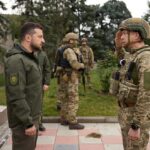
(Bloomberg) — Along with securing a third term in office on Sunday, Xi Jinping also named two key generals to key roles as he looks to modernize China’s military and keep up pressure on Taiwan.
Most Read from Bloomberg
Zhang Youxia, 72, stayed as vice chairman of the Central Military Commission and is now the oldest member of the Politburo after Xi dismantled retirement norms. The general is a long-time associate of the president and one of the few senior military officials with combat experience, having fought against Vietnam decades ago.
The other vice chair role went to He Weidong, who led the military command responsible for Taiwan, the self-governed island claimed by China. Xi said at the opening of the party congress that “reunification” with Taiwan “must be realized and it can without a doubt be realized.”
Taken together, the appointments signal Xi is forging ahead with his drive to turn the People’s Liberation Army into a more modern fighting force capable of taking Taiwan — even if it’s unlikely that he will actually use force against the island. The US’s top uniformed officer, General Mark Milley, told Congress last year that Xi wanted the ability to overrun Taiwan by 2027.
The new leadership “underscores the importance of professional military expertise at the highest levels of PLA leadership and the importance of Taiwan for the PLA as it continues to modernize,” said M. Taylor Fravel, author of Active Defense: China’s Military Strategy Since 1949 and a political science professor at the Massachusetts Institute of Technology.
Xi’s Total Control in China Injects More Risk Into Chaotic World
Xi has made modernizing the military a focus of his decade in power. Under his watch, China set a goal of building “a modern military” by 2027 and “world-class” version by 2049, the 100th anniversary of the People’s Republic.
Last year, Xi called for “breaking new ground” in weapons development. The nation has tested a hypersonic missile capable of carrying a nuclear warhead, launched its third and most advanced aircraft carrier, and conducted what the US called a “breathtaking expansion” of its strategic and nuclear arsenal.
Zhang, who was first appointed a vice chair of China’s top military body in 2017, ensures some level of continuity for the PLA as military tensions rise with the US over Taiwan. He’s also a family friend of Xi, as their fathers worked together in northwestern China during the civil war, according to Li Nan, visiting senior research fellow at the East Asian Institute of the National University of Singapore.
“Xi Jinping trusts Zhang Youxia for personal reasons, but also for practical reasons,” Li said, adding that the president doesn’t have strong connections with many top military officials.
“He has very rich fighting experience,” Li said of Zhang. “For Xi Jinping, that’s an asset.”
‘Well Prepared’
As part of China’s military modernization, Xi has also increased his focus on Taiwan over fears that pro-independence sentiment was gaining traction as the US and other countries step up support for the island. Taiwan President Tsai Ing-Wen, who took power in 2016, rejects China’s claims and says Taiwan is already a de facto nation deserving more recognition.
He Weidong led the Eastern Theater Command responsible for Taiwan, which was reconstituted from the Nanjing Military Region in 2016. He played a role in planning China’s unprecedented military drills around the island following US House Speaker Nancy Pelosi’s visit in August, the South China Morning Post reported Sunday, without saying where it got the information.
Taiwan Defense Minister Chiu Kuo-cheng told lawmakers Monday that China’s appointment of Zhang and He — along with others who possess a range of expertise in naval, rocket and aerospace fields — shows Beijing “will be tougher on Taiwan.”
“The Communist Party is well prepared,” he said, warning that cross-straits tensions were at a worrying level. “These talents can be put into good use for a long time.”
He Weidong in particular will bring more insight on China’s planning around Taiwan in meetings of the Central Military Commission and Politburo, according to Neil Thomas, a China analyst at Eurasia Group, a political risk advisory and consulting firm.
“His presence could be less about preparing for a proactive invasion of Taiwan in the next few years and more about consolidating China’s long-term advantage over Taiwan through well-calibrated gray-zone tactics and deterrence of rising Western support for Taiwan,” Thomas said.
–With assistance from Kari Lindberg, Cindy Wang and Betty Hou.
Most Read from Bloomberg Businessweek
©2022 Bloomberg L.P.




